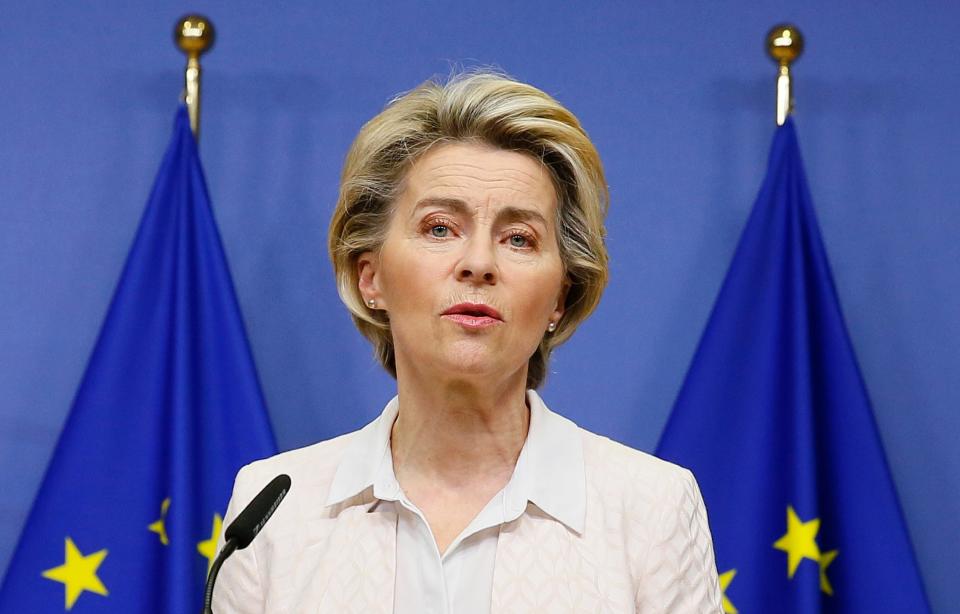Brexit: Further trade talks in bid to resolve ‘significant differences’, says EU chief after talks with Boris Johnson

Last-ditch efforts to break the deadlock in UK/EU trade talks have failed to produce a breakthrough, as Boris Johnson and European Commission president Ursula von der Leyen said that “significant differences” remain on crucial issues.
In a downbeat joint statement after phone talks lasting an hour on Saturday evening, the pair said that no free trade agreement (FTA) was “feasible” unless they could bridge long-standing gaps between their positions on fisheries, governance and standards.
They ordered chief negotiators David Frost and Michel Barnier to resume discussions in Brussels on Sunday, in a clear sign that neither side is yet ready to give up on efforts to avert a no-deal Brexit in 25 days’ time.
And the prime minister and commission president will speak again on Monday, in what is likely to be the last chance to strike a deal in time for approval on Thursday at the last scheduled summit of EU leaders before the 31 December deadline.
But the indications were that the process could drag on beyond that point, with UK sources playing down the prospect of a breakthrough on Monday.
One source described the upcoming call as no more than an opportunity to “take stock and see if progress is going to be possible”.
Progress would certainly require one side or both making significant concessions on cherished principles, such as the UK giving up the right to diverge from EU standards in areas like workplace rights or environmental protection or Brussels agreeing to negotiate access to British fishing waters on an annual basis.
If the pair decide on Monday that compromise on this scale is not possible, the UK could be facing the disruption and economic pain of a no-deal Brexit in just over three weeks’ time.
In a coincidence of timing which will add tension to the conversation, it will come as the House of Commons debates a government bid to reinsert clauses in the controversial Internal Market Bill which would allow UK ministers to override last year’s EU Withdrawal Agreement, in a move which has severely undermined trust in Brussels.
In their joint statement, Mr Johnson and Ms Von der Leyen said: “We welcomed the fact that progress has been achieved in many areas.
"Nevertheless, significant differences remain on three critical issues: level playing field, governance and fisheries. Both sides underlined that no agreement is feasible if these issues are not resolved.
“Whilst recognising the seriousness of these differences, we agreed that a further effort should be undertaken by our negotiating teams to assess whether they can be resolved.”
Mr Barnier said that talks on Sunday would show whether a deal can be struck.
"We will see if there is a way forward. Work continues tomorrow," he commented.
The obstacles to a deal identified by Mr Johnson and Ms Von der Leyen have been persistent stumbling blocks in the talks ever since the UK’s formal departure from the EU on 31 January.
London continues to resist the Brussels demand for a “level playing field” for regulation, designed to prevent the UK giving its firms a competitive advantage by undercutting European standards and using state aid to subsidise favoured businesses.
The two sides also appear far apart on fisheries, after the UK complained of “destabilising” eleventh-hour demands from France for European boats to have access to British waters for 10 years. Paris has made clear its readiness to use its veto to block any deal which harms the interests of its fleet.
Ireland, which has most to lose financially from a no-deal Brexit, continued to push for the two sides to reach agreement.
Speaking after the release of the joint statement, Micheal Martin, Ireland’s prime minister, said: “I welcome the fact that negotiators will resume their discussions on an EU and UK trade deal in Brussels tomorrow. An agreement is in everyone's best interests. Every effort should be made to reach a deal."
Labour’s shadow Cabinet Office minister Rachel Reeves said: "The British people were promised a deal and, with time running out, we urge both sides to get on with reaching an agreement.
“We can then focus on the job at hand which is securing the economy and rebuilding our country from the pandemic."
Failure to seal and ratify an FTA by the end of 2020 would see the UK leave the EU’s single market without an agreement to govern commerce with its nearest neighbour and most important trading partner.
Mr Johnson insists that the country would thrive under World Trade Organisation rules, but his independent economic forecasters last week predicted it would knock 2 per cent off UK GDP in 2021, on top of the 4 per cent long-term hit to the economy expected from Brexit itself.
WTO rules would require the imposition of tariffs on a wide range of goods, including 10 per cent on cars and an average 18 per cent on foodstuffs imported from the EU.
Read More
‘We’ll see’ if trade deal still possible, Barnier says
Bid to stop ‘bullying’ post-Brexit UK tariffs ruining African farmers
What are the issues holding up a Brexit trade deal with the EU?
Why some Labour MPs think a hard Brexit would be their fault

 Yahoo Finance
Yahoo Finance 